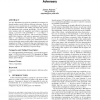1816 search results - page 14 / 364 » Trace oblivious computation |
PODC
2012
ACM
12 years 7 days ago
2012
ACM
Two new algorithms are given for randomized consensus in a shared-memory model with an oblivious adversary. Each is based on a new construction of a conciliator, an object that gu...
WG
2010
Springer
13 years 8 months ago
2010
Springer
In this paper we investigate the basic problem of Exploration of a graph by a group of identical mobile computational entities, called robots, operating autonomously and asynchrono...
ENTCS
2011
13 years 1 months ago
2011
We revisit the connection between three notions of computation: Moggi’s monads, Hughes’s arrows and McBride and Paterson’s idioms (also called applicative functors). We show...
CDC
2008
IEEE
14 years 4 months ago
2008
IEEE
— We study stochastic dynamic games with a large number of players, where players are coupled via their cost functions. A standard solution concept for stochastic games is Markov...
IACR
2011
12 years 9 months ago
2011
In this paper we present the first public key encryption scheme that is structure preserving, i.e., our encryption scheme uses only algebraic operations. In particular it does not...

